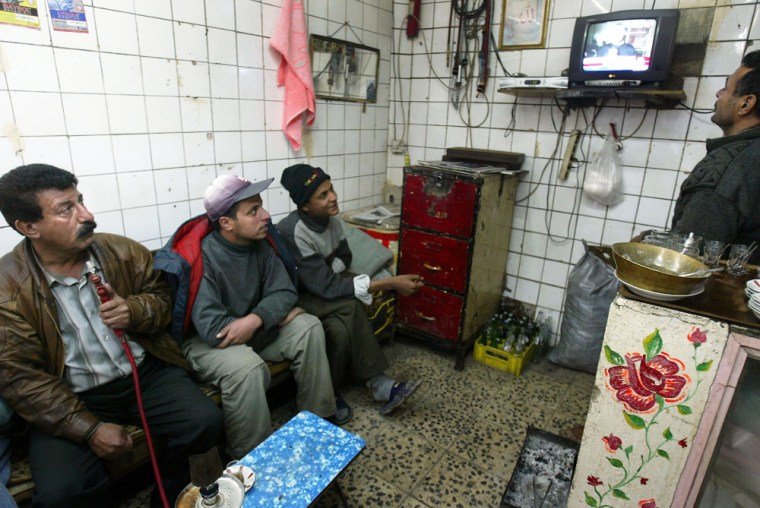Shiites may have won the lion's share of the vote in Iraq's elections but the main alliance will still have to find new allies if it wants a majority in the new parliament and to secure passage of a new constitution.
And while Sunni Arabs, who for decades provided Iraq's ruling elite, failed to win more than a slither of the vote and will be marginalized in the National Assembly, they still have to be brought on board for the constitution to be agreed.
"The result reflects the fractious, cross-cutting nature of Iraq, where there are no neat divisions," Rosemary Hollis, head of the Middle East program at Royal Institute of International Affairs, told Reuters after results were announced on Sunday.
"Since it has no majority, the Shiite bloc must now not only hold together as a group, but form an alliance with others. Their first port of call would be the Kurds."
The Shiite alliance, drawn up with the blessing of top Shiite cleric Ayatollah Ali al-Sistani, won 48 percent of the vote, with the Kurds coming second with 25 percent.
New political landscape
Iraqi national security adviser Mowaffaq al-Rubaie, a Shiite former exile, described the results as a paradigm shift for the Shiites, calling it "the greatest day of my life."
But as well as for the Shiites, the results mean a drastically changed political landscape for Sunni Arabs, a 20 percent minority who are now out in the cold after decades in power under Saddam Hussein.
Yet while Sunnis may be under-represented in the 275-seat assembly, it is still possible for them to play a role in Iraq's future, and the fact the main Shiite alliance did less well than forecast increases the likelihood of that happening.
"The reassuring thing for some people is that the so-called Sistani list did not get the overwhelming majority they had expected," said Charles Tripp, Iraq scholar at London's School of African and Oriental Studies.
"The key thing will be which coalitions can be cobbled together for any issue. It may be good that no group can dominate, but it could also delay decision-making on the big things like federalism, Islamic law and U.S. withdrawal."
Not only does the Shiite alliance's failure to win a majority mean that it will have to find allies, it also means it will likely have to temper its stricter religious principles if it wants to secure consensus with secular parties.
Poor showing
But there is still a mountain facing the Sunni minority if it is to reclaim even a fraction of its former power.
The most successful Sunni Arab coalition was that headed by interim President Ghazi al-Yawar, a senior member of one of Iraq's largest tribes, which managed to garner just 150,000 votes, less than two percent of those cast.
While Shiites will likely hold somewhere around 170 of the National Assembly seats, and Kurds, who make up 15-20 percent of Iraq's population, will have around 70 seats, Sunni Arabs may struggle to get more than 10.
"After the seats are distributed we will see a small number for Sunni Arabs and also a small number of secular Iraqis," Adnan Pachachi, a respected secular Sunni Arab leader whose list likely failed to win a seat, told Reuters.
"I am not satisfied with the result ... The image of Iraq that these results suggest is not real. That is obvious."
Pachachi, who served as Iraq's foreign minister before Saddam came to power, is regarded as a moderate elder statesman and was expected to rally some votes. The fact he performed so poorly is indicative of the problems facing the Sunni minority.
Better luck next time
"It hammers home the notion that we are dealing with a very fragmented assembly," said Tripp. "Politics will be very fluid and there could be prolonged debate over the constitution."
The writing of the constitution is likely to prove the most contentious issue in the months ahead. Before Sunday's results, Shiite leaders were at pains to insist Sunnis would be involved in the document's drafting even if their supporters didn't vote.
While they may have few seats in the assembly, a Sunni Arab could still be given the role of leader of the assembly as a token, a position that will give Sunnis influence in deciding the process followed for drawing up the constitution.
Shiites and Kurds know that if the Sunnis are not involved in writing the constitution then they can always veto it -- if two-thirds of voters in any three provinces reject the constitution in a referendum due in October, it must be redrawn.
That is an incentive for inclusiveness, and it may be the best opportunity the Sunni Arab population has to be involved in carving out the country's future.
They will also be conscious that while they may have been losers this time, another election in Iraq is only 10 months away -- in December. Having performed so poorly this time, they are likely be spurred on to do much better next time around.
